Clifford Garstang's Blog, page 83
March 29, 2013
Tips for Writers: Being a Good Literary Citizen
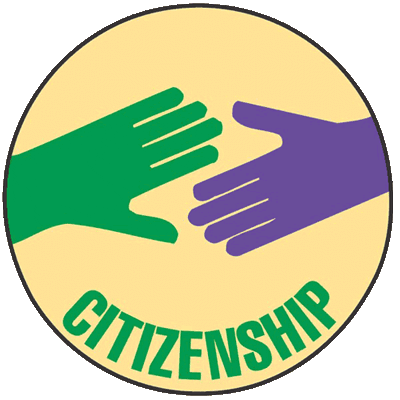 This morning, a writer friend of mine posted some nice words on Facebook about my book, What the Zhang Boys Know. I appreciated his comments, and would have appreciated them even if he weren’t a terrific, well-regarded writer. He was being a good literary citizen, and it got me thinking about what that means. I had some thoughts about this myself, but a quick Google search revealed that another writer friend of mine, Cathy Day, has already given this subject a lot of attention–she teaches a course in it–and a couple of years ago wrote this blog post about it: Literary Citizenship by Cathy Day. Her piece pretty much covers everything I was thinking about, but let me reiterate.
This morning, a writer friend of mine posted some nice words on Facebook about my book, What the Zhang Boys Know. I appreciated his comments, and would have appreciated them even if he weren’t a terrific, well-regarded writer. He was being a good literary citizen, and it got me thinking about what that means. I had some thoughts about this myself, but a quick Google search revealed that another writer friend of mine, Cathy Day, has already given this subject a lot of attention–she teaches a course in it–and a couple of years ago wrote this blog post about it: Literary Citizenship by Cathy Day. Her piece pretty much covers everything I was thinking about, but let me reiterate.
Her first suggestion is to write a note to an author when you read something you like, or take that a step further–befriend the author on Facebook, or do an interview with the author that might appear in a magazine or a blog. Anything to spread the word.
The next one is related, and that’s to talk up good books. Write about them on your blog. Tell your friends. Tell the world! Review books on Amazon and Goodreads. Do full reviews and publish them in magazines or literary journals or newspapers. This is a big one for me. Especially when I read something published by a small press or an emerging writer, I’ll rate it on Amazon or Goodreads or both, and I’ll usually write a short review on my blog. It means a lot to authors, and it really does help sales.
Cathy also suggests that if you want to be published in literary journals you should read and support journals. Supporting means, at the least, subscribing. This is important advice. I subscribe to several and if every writer did that, the magazines wouldn’t be struggling to survive. On a similar note, if you want to publish books, Cathy suggests that you BUY books. I love that she doesn’t insist on paper vs. eBooks or Indie bookstores vs. Barnes & Noble or even Amazon. Just. Buy. Books. It’s important. (This one is easy for me. I love owning books.)
The last one Cathy mentions is a catch-all–be passionate about books and writing. She advises that if you live in a literary desert, create your own oasis by forming a writing group, talking about books, running a reading series, etc. These are all great suggestions–it’s something that I’ve done in my town with the SWAG Writers Group. It’s named for our town and county and we hold meetings and open mics and we host readings by visiting writers. It’s not that hard!
I would add one thing to Cathy’s list, and it’s really already implied, but I would urge writers to attend readings and other literary events. You don’t have to buy the book, although that’s nice too, but just show up. Be a responsive audience member. Lots of people attend open mic nights because they love to hear themselves read, but they don’t drag themselves out of the house to hear someone else read. That’s not good citizenship, in my book. Pay it forward and support your fellow writers.
Thanks to Cathy Day for her suggestions.
March 27, 2013
2013 Reading: The Case for God by Karen Armstrong
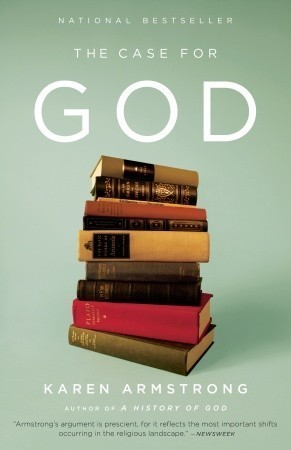 The Case for God by Karen Armstrong is my book club’s selection for March. (See Reading Liberally-Staunton.)
The Case for God by Karen Armstrong is my book club’s selection for March. (See Reading Liberally-Staunton.)
It was an interesting read, although frustrating at times. Armstrong gives a quick survey of the development of religion, especially the book-based religions, and the evolution (you should pardon the expression) in the concept of “God.” If she’s right that the modern concept of “God” is very different from what it was, then the rise of Christianity and Islam seem even more puzzling. Because the “modern” view of “God” seems rather backward, whereas the older views seem more compatible with modern science.
But Armstrong loses me with her attacks on the modern atheists. She is critical of them for being critical of the contemporary church, but that’s the institution we have to work with. If religions today held the same concept of “God” that she says they used to have, then I think there would be little argument between the atheists and the believers.
That aside, the book is a handy compilation of the history of Western thought . . .
March 25, 2013
The New Yorker: “Marjorie Lemke” by Sarah Braunstein
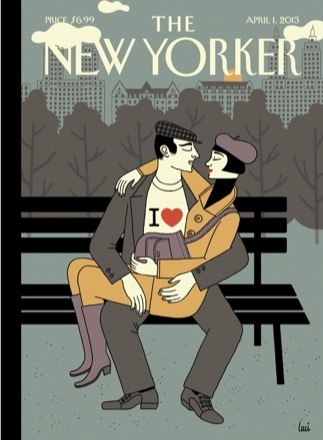 April 1, 2013: “Marjorie Lemke” by Sarah Braunstein
April 1, 2013: “Marjorie Lemke” by Sarah Braunstein
Marjorie Lemke was called a “major loser” in high school. It wasn’t true then, but, according to her, it is now. She’s battling addiction, the junkie she married ran off, and she’s raising her baby Della while cleaning motel rooms. (One thing I do like is that Della is always with her, riding along in the cleaning cart on a bed of towels.) As the author says in the Q&A with Sarah Braunstein, it isn’t really true that she’s a loser. She’s struggling, but at least she’s putting up a fight.
She enters a room to clean it and finds that it is occupied by Gabe. She’s apprehensive, but Gabe seems nice enough and wants her to clean around him. It turns out that he’s recovering from gastric bypass surgery, undergone because his wife says he’d gotten too fat. The wife is a union buster and she’s also staying in the room, except when she’s out … busting unions. Marjorie and Gabe begin an affair, for want of a better word. He’s confined to the room and she seems to like that fact—it’s a contrast with her husband who ran off.
Gradually, she gets the idea that Gabe and his wife might want to adopt her baby, Della. She knows that raising the kid on her own will be tough, and maybe this couple will be good parents. (Gabe has poked a hole in his wife’s diaphragm because he’s hoping they’ll conceive.) But, if anyone is a loser in the story, it seems to me that Gabe is it.
It’s not clear where this story is headed in the end.
It’s an okay story. I don’t love it.
March 24, 2013
Wrap-up: 2013 Virginia Festival of the Book
 The 19th Virginia Festival of the Book is now history, and it was a good one. I was there for part of every day this year–many years I skip a day just because driving back and forth is a pain–and had a great time. Here are some of the highlights of my festival:
The 19th Virginia Festival of the Book is now history, and it was a good one. I was there for part of every day this year–many years I skip a day just because driving back and forth is a pain–and had a great time. Here are some of the highlights of my festival:
My first panel, The Ties that Bind, was expertly moderated by Leeyanne Moore at The Bridge. The five panelists–me, Molly Cox Bryan, Lydia Netzer, Wendy Shang, and Camisha Jones–discussed our own work and Amy Tan’s The Joy Luck Club, which is this year’s selection for Charlottesville’s Big Read. We had a good discussion and good refreshments in a very nice venue.
The next day I attended a fiction panel called Hauntings at Barnes & Noble featuring Alma Katsu, Laura Brodie, and Brad Bryant. I’d heard Alma before and I have Laura’s and Brad’s books already, but it was pleasant to hear the discussion and the moderator for this panel also did a very good job.
The next highlight for me was being on the short story panel at Barnes & Noble along with Robert Day, E.J. Levy, and Kurt Rheinheimer. We each read for a few minutes and then answered a lot of questions from the audience. It was fun to meet Robert Day and to renew my acquaintances with Kurt and E.J.
I headed home after that, but on Friday I was back bright and early for more. I moderated a panel at the UVa bookstore called Forbidden Attraction, featuring Maryanne O’Hara, Erika Robuck, Bill Roorbach, and Margaret Wrinkle. I’d read all four of the novels and really enjoyed the discussion during the panel, and I was pleased to see brisk book sales afterward.
Then I hurried back over to the downtown mall for Bella Stander’s annual lunch at Bashir’s. I was at one end of the table so didn’t get to talk to everyone but I did get to know a few people I hadn’t met before. Included in that group were several people I then saw on a panel at 2pm at New Dominion called Journeys. That panel included Sheri Reynolds, whom I’d heard a few times before (she was funny, as always), plus my lunch companions: Sharon Short, Kathleen McCleary, and Kimberley Brock. They gave good readings and there was a good discussion. (But why all women on the panel, I wondered.)
Later in the day, after yet another panel, I met Margaret Wrinkle for drinks at the debut author reception, and I had a nice chat there with, among others, Tara Conklin, whose novel sounds quite interesting.
On Saturday I had committed to working the bookfair for WriterHouse.org, so I did that, and then I found a coffee shop to get some work done. At 2pm I went to a very interesting discussion by Ronald Collins and David Skover, two first amendment scholars, about their book Mania, which deals with some of the man figures of the Beat Generation–Ginsberg, Kerouac, Burroughs, and Ferlinghetti–and the famous lawsuit concerning Ginsberg’s Howl. After their talk I had to buy that book.
Then I wandered back to the Omni Hotel–where the publication day and crime day panels took place–to attend the Agents’ Roundtable. But 2 of the 4 agents were unable to be there and I quickly realized they weren’t going to be saying anything I hadn’t heard a million times before, so I left. I sat on the mall in the sunshine and did a little work and then I took a walk.
Then came one of my favorite events of the festival–the Authors’ Reception. Once again, this was upstairs at the Paramount Theater. The food and drink were good and it was fun to talk to a number of old friends and also some of the writers I’d met during the week.
I don’t usually return for the Sunday events, but this year there were several things I wanted to attend. So, despite the threat of snow, I drove over to Charlottesville one more time. First I went to the The Magic of Words, an event that primarily celebrated the launch of the 2013 Blue Ridge Anthology, which includes a story by me. The special guest for the launch was Rita Mae Brown, who spoke for 20 minutes on words and writing. Then some contributors to the anthology read, but the program was running long and I had to leave.
And the reason I had to leave was that I wanted to attend the program at 3pm at the UVa bookstore about Seduction. The speakers were Madeline Miller, author of The Song of Achilles, who appeared by Skype, Manil Suri, author of The City of Devi (and also the Death of Vishnu, which I’ve read), and Betsy Prioleau, author of Swoon and Seductress. Bethanne Patrick did a great job of guiding the discussion, but all three authors were very interesting in their comments. I left with copies of Miller’s and Suri’s new books, and I may well pick up one or more of Prioleau’s in the near future.
By the time that program was over at 4:15, the snow was coming down hard. So instead of attending a party I’d been invited to (to celebrate the “wrap” of the festival), I hit the road. And I’m glad I did. Driving was tough, especially as I approached the top of the mountain, and then again after I got deeper into the Valley near Staunton.
I was very glad to be home!
March 22, 2013
2013 Reading: Pagan Babies by Elmore Leonard
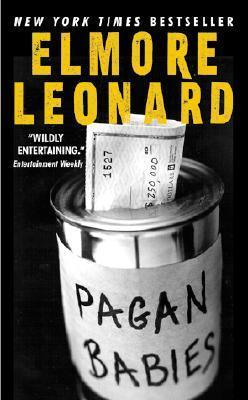 Pagan Babies by Elmore Leonard is entertaining. It seemed, in the first half, as though it might be more than that, but in the end, that’s the best I can say about it.
Pagan Babies by Elmore Leonard is entertaining. It seemed, in the first half, as though it might be more than that, but in the end, that’s the best I can say about it.
The book begins with Father Terry Dunn in Rwanda in a church that serves a village hard hit by the genocide. This seemed like a departure for Elmore Leonard (although, have I read Leonard before?) but it was fascinating, dark, and very serious.
Then the perspective switches to that of Father Dunn’s brother back in the U.S. He’s a personal injury lawyer, and that alone was to suggest that maybe there is a connection to the normal Leonard subject matter after all.
And then these stories connect, leaving the seriousness behind, going only for “entertaining.” That should be enough, and the rest of the book, with that in mind, was satisfying. (I can’t really say more without giving too much away.)
March 21, 2013
2013 Reading: Cascade by Maryanne O’Hara
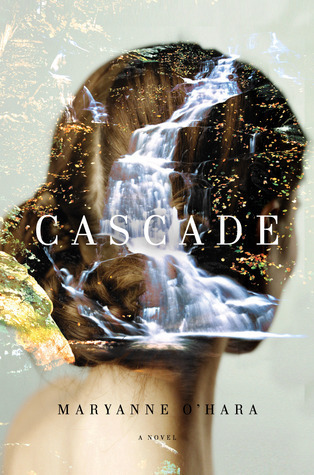 Cascade: A Novel by Maryanne O’Hara was a pleasure to read. It begins in late 1934 when Desdemona Hart, a trained artist, has married Asa Spaulding, the pharmacist for the town of Cascade, in order to provide a home for her dying father’s last days. But after her father’s death, it becomes clear to her that she can’t remain trapped in the small town or in her marriage.
Cascade: A Novel by Maryanne O’Hara was a pleasure to read. It begins in late 1934 when Desdemona Hart, a trained artist, has married Asa Spaulding, the pharmacist for the town of Cascade, in order to provide a home for her dying father’s last days. But after her father’s death, it becomes clear to her that she can’t remain trapped in the small town or in her marriage.
At the same time, Cascade is threatened with inundation by a project to build a reservoir for Boston. Asa is at the forefront of the fight against the reservoir and Dez, as she’s known, finds a way to use her art to help, although she is conflicted because her work is more highly valued by her magazine employer if Cascade is actually going to drown. Ironically, Cascade’s death is what she needs to save herself.
There’s also forbidden love, artistic rivalry, some intrigue. And there’s also a good bit of Shakespeare, as Dez’s father had built a theater in the town of Cascade that Dez would like to save.
Although the ending feels a bit rushed to me, it’s a very engaging story. When Dez begins to submit her work to magazines, I was cheering for her, admiring her courage.
I’m looking forward to discussing this book tomorrow on a panel at the Virginia Festival of the Book called Forbidden Attraction, also featuring novels by Bill Roorbach, Erika Robuck, and Margaret Wrinkle.
March 20, 2013
Tips for Writers: She shrugged
 I frequently encounter this sentence in the work of both students and would-be contributors to my magazine: “She shrugged her shoulders.”
I frequently encounter this sentence in the work of both students and would-be contributors to my magazine: “She shrugged her shoulders.”
With student work, invariably I cross out “her shoulders” and write in the margins, “what other body parts can be shrugged?” With submissions to the magazine, you can guess what I do (usually).
The verb “to shrug” means “to raise and contract (the shoulders)” and thus adding shoulders as an object of shrug is, at best, redundant. (The expression “shrug off” is different, of course.)
Midge Raymond interviews me
 Midge Raymond, author of Forgetting English, interviews me on her blog: Q&A with Clifford Garstang. Thanks, Midge!
Midge Raymond, author of Forgetting English, interviews me on her blog: Q&A with Clifford Garstang. Thanks, Midge!
March 19, 2013
2013 Reading: Hemingway’s Girl by Erika Robuck
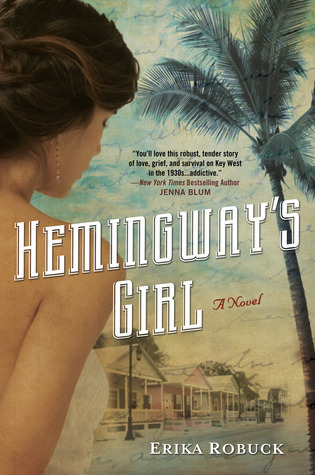 Hemingway’s Girl by Erika Robuck is a fast read, and I recommend it. It’s a historical novel set in 1935 (with a prologue and epilogue from 1961) in Key West and features Ernest Hemingway and his family. But the protagonist of the book, the primary narrative consciousness, is Mariella, a young woman who works as a maid in the Hemingway household.
Hemingway’s Girl by Erika Robuck is a fast read, and I recommend it. It’s a historical novel set in 1935 (with a prologue and epilogue from 1961) in Key West and features Ernest Hemingway and his family. But the protagonist of the book, the primary narrative consciousness, is Mariella, a young woman who works as a maid in the Hemingway household.
She loves Papa and sometimes despises him. She also loves her father, who has recently died, and a soldier she meets, Gavin, a veteran of the First World War.
The book begins with a 1961 prologue that tells us Papa Hemingway has recently killed himself. We also meet Mariella’s son, Jake. Knowing her fondness for Hemingway, and recalling that Jake Barnes was the protagonist of The Sun Also Rises, the reader now must keep reading to find out if Mariella’s son is the product of a relationship with Ernest. I’m not telling.
Besides that clever trickery, the book does have a slight tendency toward melodrama–there’s a hurricane scene at the climax of the books that feels a little over the top to me–but is nonetheless very readable. I enjoyed spending these past hours with these characters, and I recommend the book.
The New Yorker: “The Judge’s Will” by Ruth Prawer Jhabvala
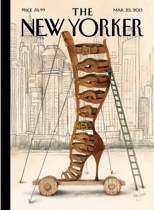 March 25, 2013: “The Judge’s Will” by Ruth Prawer Jhabvala
March 25, 2013: “The Judge’s Will” by Ruth Prawer Jhabvala
As of today, March 18, no Q&A is posted, so there’s no help there. I’m not sure we really need it, however, as this story, set in New Delhi, seems pretty straightforward. (You can read it for free on the website.) The Judge has just had his second heart attack, and so his mortality is on his mind. He tells his wife Binny, who tells their son Yasi, that he has kept a mistress for many years and has provided for her in his will. Binny isn’t outraged, at first, and finds it interesting, as if it were happening to someone else. She doesn’t like it much, however, when the Judge sends for the women to come to the house.
She gets angrier and angrier, revealing the traits that no doubt drove the Judge to the arms of another woman in the first place. Binny isn’t a very appealing character, but then no one in this story is.
But then the mistress falls ill. At first, Yasi is sent to tend to her, but then Binny goes, and she actually seems to be showing some compassion for this woman who was taken from a brothel at age 15 and has known no other life.
So there is an element of class divide revealed in the story, and maybe something about a divide between Delhi and Bombay (Binny’s home). Other than that, I don’t think this story does enough work. Interesting beginning of something, maybe.



